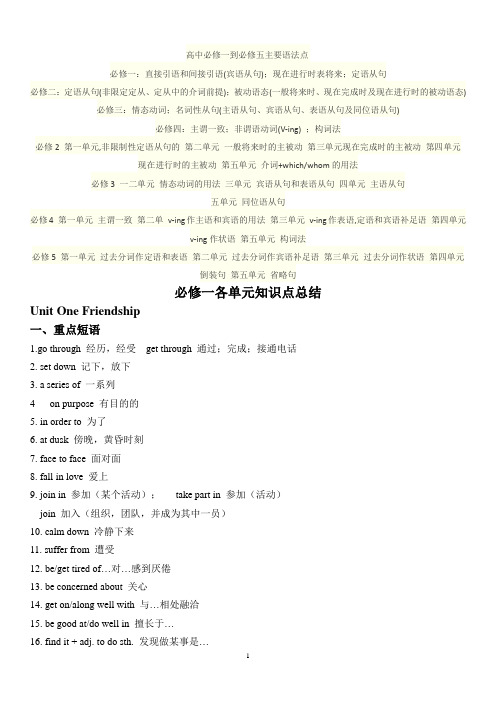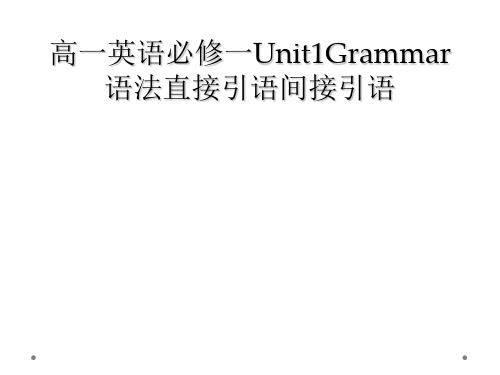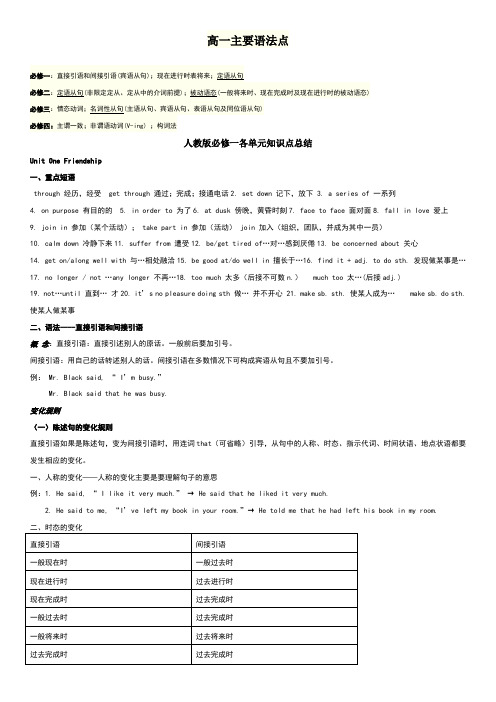人教版高中英语必修1U1 直接引语及间接引基础复习
高一英语Unit 1 grammar直接引语与间接引语-人教版[整理]
![高一英语Unit 1 grammar直接引语与间接引语-人教版[整理]](https://img.taocdn.com/s3/m/8c5ea96ea45177232f60a278.png)
Conclusion
1. 当主句的谓语动词是一般现在时的时候 2. 当主句的谓语动词是将来时的时候 3. 当直接引语部分带有具体的过去时间状 语时 4. 当直接引语中有以when, while引导的从 句,表示过去的时间时 5. 当直接引语是客观真理或自然现象时 6. 当引语是谚语、格言时 7. 当直接引语中有情态动词should, would, could, had better, would rather, might, must, ought to, used to, need时
Tom
said that they were listening to the pop music. Mother asked, “Have you finished your homework before you watch TV?” Mother asked me whether I had finished my homework before I watched TV.
Our teacher said to us, “Light travels faster than sound. ” Our teacher told us that light travels faster than sound. He said,“Practice makes perfect. ” He said that practice makes perfect. He said, “She must be a teacher. ” He said that she must be a teacher. The doctor said, “You'd better drink plenty of water. ” The doctor said I'd better drink plenty of water.
(完整版)人教版高中英语必修语法知识点总结

高中必修一到必修五主要语法点必修一:直接引语和间接引语(宾语从句);现在进行时表将来;定语从句必修二:定语从句(非限定定从、定从中的介词前提);被动语态(一般将来时、现在完成时及现在进行时的被动语态) 必修三:情态动词;名词性从句(主语从句、宾语从句、表语从句及同位语从句)必修四:主谓一致;非谓语动词(V-ing) ;构词法必修2 第一单元,非限制性定语从句的第二单元一般将来时的主被动第三单元现在完成时的主被动第四单元现在进行时的主被动第五单元介词+which/whom的用法必修3 一二单元情态动词的用法三单元宾语从句和表语从句四单元主语从句五单元同位语从句必修4 第一单元主谓一致第二单v-ing作主语和宾语的用法第三单元v-ing作表语,定语和宾语补足语第四单元v-ing作状语第五单元构词法必修5 第一单元过去分词作定语和表语第二单元过去分词作宾语补足语第三单元过去分词作状语第四单元倒装句第五单元省略句必修一各单元知识点总结Unit One Friendship一、重点短语1.go through 经历,经受get through 通过;完成;接通电话2. set down 记下,放下3. a series of 一系列4 on purpose 有目的的5. in order to 为了6. at dusk 傍晚,黄昏时刻7. face to face 面对面8. fall in love 爱上9. join in 参加(某个活动);take part in 参加(活动)join 加入(组织,团队,并成为其中一员)10. calm down 冷静下来11. suffer from 遭受12. be/get tired of…对…感到厌倦13. be concerned about 关心14. get on/along well with 与…相处融洽15. be good at/do well in 擅长于…16. find it + adj. to do sth. 发现做某事是…17. no longer / not …any longer 不再…18. too much 太多(后接不可数n.)much too 太…(后接adj.)19. not…until 直到…才20. it’s no pleasure doing sth 做…并不开心21. make sb. sth. 使某人成为…make sb. do sth. 使某人做某事二、语法----直接引语和间接引语概念:直接引语:直接引述别人的原话。
高一英语必修一Unit1Grammar语法直接引语间接引语

仍用一般现在时。例如: Teacher said to us:" The moon moves round
the earth." Teacher told us the moon moves round the earth. The teacher said to us : “Light travels faster
宾语从句
判断以下哪些句子属于间接引语
She said that she didn’t want to be a teacher. 间接 She said, “I don’t want to be a teacher〞.直接 He said, “ I like playing football〞. 直接 He said that he liked playing football. 间接
3. Mr Black said, “I have walked a long way this week.〞 Mr Black said that __ a long way __. A. I had walked…last week B. he had walked…that week C. I walked…last week D. he has walked…this week
〞 • 间接引语 Mum told me that I could clean my bedroom the next day . • Mr. Smith said,“He is a good worker. ’’ • Mr. Smith said that he was a good worker.
3.人称的变化
• 直接引语里的第一人称和第二人称,变间接引语时,人称要做相 应调整。例如:
人教版高中英语各单元语法点汇总

Unit 2 Unit 3 Unit 4 Unit 5
选 修 Unit 1
七
Unit 2
Unit 3
Unit 4
单元
非谓语动词:ing 形式作主语和宾语
非谓语动词:ing 形式作表语、定语和宾语补足
非谓语动词:ing 形式作定语和状语
合成词
语法点
非谓语动词:过去分词形式作定语、表语
非谓语动词:过去分词形式作宾语补足语
复习限制性定语从句
Unit 5
单元
选 修 Unit 1
八
Unit 2
Unit 3
Unit 4 Unit 5
复习非限制性定语从句 语法点 复习名词性从句:作为主语、宾语和表语 复习单词、短语和从句作同位语 复习非谓语动词:过去分词形式作定语、表语 和宾语补足语 复习非谓语动词:过去分词形式作状语 复习动词时态:包括现在完成进行时
非谓语动词:过去分词形式作状语、定语
倒装句
省略句
语法点
虚
拟
语
1: I wish, I could/did/would… If
do…
虚拟语气 2: If I had done…, I woul
It 的特殊用法(1)
It 的特殊用法(2)
复习 ing 形式
语法点
复习不定式
复习被动语态 1:包括不定式
复习被动语态 2:包括 ing 形式
Unit 5 Nelson Mandela—a modern hero 定语从句 2:when, where, why, 介词+whi
单元
语法点
必修二 Unit 1
定语从句 3:限制性定语从句和非限制性定语从
Unit 2
高中英语人教版新课标必修1 直接引语和间接引引语

指示代词,时间状语,地点状语,动词的变化 直接引语 间接引语
today this now here tonight these yesterday come this week (month/year…) last week (month / year …) the day before yesterday the day after tomorrow three days ago tomorrow next week yesterday afternoon that day that then there that night those the day before go that week (month / year …) the week (month /before …) two days before/earlier in two days’ time three days before /earlier the next/following day the next (following) week the afternoon before
(3) 祈使句:转述祈使句时要将祈使句的动词原形变为
带 to 的不定式并在不定式的前面根据句子的意思加上 tell , ask ,order 等动词 其句型是:tell /ask / order /command/beg someone (not ) to do something . “Make sure the door is shut .” she said to her little son. She told her little son to make sure the door was shut . “Don’t smoke in the room .” he said to me . He told me not to smoke in the room .
高中英语必修1:Unit 1 直接引语和间接引语

Unit one FriendshipDirect speech and indirect speech(直接引语和间接引语)一.基本概念I直接引语变为间接引语1)、直接引语为陈述句2)、直接引语为祈使句3)、直接引语为疑问句4)、直接引语为感叹句II1、直接引语和间接引语都属于宾语从句2、直接引语和间接引语的概念(1)直接引语:一字不改地引述别人的话(2)间接引语:用说话人自己的话转述别人的话二.变换类型1.直接引语为陈述句直接引语为陈述句,用that引导(口语中可以省略)。
引述动词有:say, tell等。
陈述句变间接引语要注意:1、人称的变化2、指示代词、时间状语、地点状语和动词的变化3、时态的变化4、人称的变化。
一般的规则:一随主,二随宾,三不变例如:The teacher said, “John, you must bring your book to the class. ”1> 第三者说:The teacher told John that he must bring his book to the class.2> 别人对约翰说:The teacher said that you must bring your book to the class.3> 约翰自己说:The teacher said that I must bring my book to the class.I指示代词、时间状语、地点状语和动词的变化1〉指示代词的变化this---- that these----those2〉时间状语的变化now---- then ago---- before today----that day yesterday----the day before; theprevious day tomorrow----the next day; the following day the day beforeyesterday----two days before the day after tomorrow----two days later nextweek/month, etc.----the next week/month, etc. last week/month, etc.----theweek/month before3〉地点状语的变化here----there4〉动词的变化come----go注:在当地转述时,here不变为there,come不变为go.在当天转述时,yesterday, tomorrow等时间状语也不变。
人教版高中英语必修一知识点+语法总结(全面)

高一主要语法点人教版必修一各单元知识点总结Unit One Friendship一、重点短语through 经历,经受 get through 通过;完成;接通电话2. set down 记下,放下 3. a series of 一系列4. on purpose 有目的的5. in order to 为了6. at dusk 傍晚,黄昏时刻7. face to face 面对面8. fall in love 爱上9. join in 参加(某个活动); take part in 参加(活动) join 加入(组织,团队,并成为其中一员)10. calm down 冷静下来11. suffer from 遭受12. be/get tired of…对…感到厌倦13. be concerned about 关心14. get on/along well with 与…相处融洽15. be good at/do well in 擅长于…16. find it + adj. to do sth. 发现做某事是…17. no longer / not …any longer 不再…18. too much 太多(后接不可数n.) much too 太…(后接adj.)19. not…until 直到… 才20. it’s no pleasure doing sth 做… 并不开心 21. make sb. sth. 使某人成为… make sb. do sth. 使某人做某事二、语法----直接引语和间接引语概念:直接引语:直接引述别人的原话。
一般前后要加引号。
间接引语:用自己的话转述别人的话。
间接引语在多数情况下可构成宾语从句且不要加引号。
例:Mr. Black said, “ I’m busy.”Mr. Black said that he was busy.变化规则(一)陈述句的变化规则直接引语如果是陈述句,变为间接引语时,用连词that(可省略)引导,从句中的人称、时态、指示代词、时间状语、地点状语都要发生相应的变化。
人教版高中英语必修一Unit1Friendship直接引语和间接引语课件(共33张PPT)

现在完成时→过去完成时
Paul said,“our team has won the match” 改为 Paul said their team had won the match.
过去完成式→过去完成时
He said,“I had finished my homework before supper.” 改为 He said that he had finished his homework before supper.
“ I’ll come to help you wherever you need my help”,he answered her. 换成 He answered her that he would come to help her wherever she needed his help.
She said to me,“your pronunciation is better than his”. 换成
四、指示代词、时间状Байду номын сангаас、 地点状语和动词的变化
1.指示代词
this 改为that She said,“she is coming this week” She said that she was coming that week.
these改为those He said,“these books are mine.” He said those books were his.
3、变为特殊疑问句由who,what,when等 疑问词引导的宾语从句。
He said,“where is Mr Wang?” 换成 He asked where Mr Wang was.
三、时态变化
主句的谓语动词一般过去时, 从句的谓语动词在时态方面作出相 应的变化,总体是向前推一个时态。
人教版高中英语必修一unit1直接引语和间接引语.docx

高中英语学习材料***鼎尚图文理制作***Unit1 Friendship语法直接引语和间接引语概念引入:我们先看下面的句子:1.John said, “I'm going to London with my father.”约翰说:“我要和父亲到伦敦去。
”2.She said, "Do you often come here to read newspapers?"她说:“你经常来这儿看报吗?3.I asked him, "Will you stay at home or go to a film tonight?"我问他:“你今晚是待在家还是去看电影?”4.“Why don't you take a walk after supper?” he asked.他问:“饭后干嘛不出去走走呢?”从上述四个例句看出:引号内是直接引用别人的原话,这种句子为直接引语。
1.John said that he was going to London with his father.约翰说,他要和他父亲去伦敦。
2.She asked me if (whether) I often went there to read newspapers.她问我是否经常去那儿看报。
3.I asked him whether he would stay at home or go to a film that night.我问他那天晚上是待在家还是去看电影。
4.He advised me to take a walk after supper.他建议我晚饭后出去走走。
从第二组的四个例句看出,都是别人的原话进行了转述。
在转述中,人称、时态、代词、时间状语的表达都有所变化。
那么从直接引语变成间接引语,都有哪些部分需要变化呢?“语法讲解”部分将告诉你具体的变化规则。
用法讲解【高清课堂:直接引语和间接引语P1】,课文原句回放首先请大家看下面几个句子,这几个句子来自课文,分别是直接引语和间接引语。
最新人教版高中英语必修一Unit1语法知识

GrammarDirect and Indirect Speech Ⅰ直接引语和间接引语(Ⅰ)直接引语(direct speech):直接引用别人的话, 把它放在引号内。
间接引语(indirect speech):用自己的话转述别人的话。
1.转述他人的陈述→陈述句She said , “I’m going to Beijing.”She said that she was going to Beijing.2.转述他人的疑问→一般疑问句He asked, “Are you a doctor?”He asked me if/whether I was a doctor.3.转述他人的问题→特殊疑问句She asked, “What are you doing?”She asked me what I was doing.直接引语变成间接引语, 句子结构的变化陈述句用连词that引导, that在口语中常省略。
主句的谓语动词可直接用引语中的said, 也可用told 来代替, 注意, 可以说said that, said to sb. that, told sb. that, 不可直接说told that。
He said, “I have been to Japan.”He said to us that he had been to Japan.She said, “I’ll give you an exam tomorrow.”She told us that she would give us an exam tomorrow.陈述句解题步骤:“I don’t like computers,”Sarah said to her friends.Sarah said to her friends that(I don’t like computers.)She didn’tSarah said to her friends that she didn’t like computers.一般疑问句间接引语用连词whether或if引导, 原主句中谓语动词said要改为asked(me/him/us等), 语序是陈述句的语序Tom said, “Do you have any difficultywith English?”Tom asked (me) whether/if I had anydifficulty with English.He said, “You are interested in English,aren’t you?”He asked whether I was interested in English.一般疑问句解题步骤:Is it easy to improve the condition of the soil?( They asked him )It is easy to improve the condition of the soil.They asked him if (it is easy to improve the condition of the soil.)Asked is wasThey asked him if it was easy to improve the condition of the soil.特殊疑问句原来的疑问词作为间接引语的连词, 主句的谓语动词用ask (sb.) 来表达, 语序改为陈述句语序。
新课标人教版高一英语必修一U1Friendship直接引语间接引语语法讲解与练习

适用文案高一英语必修一U1 语法专题直接引语和间接引语 (1)Name: _______________ Tel:_______________ Warming up:一、观点1.直接引语:当我们引用他人的话语时,假如引用的是原话,被引用的部分就叫作直接引语。
The teacherasked,“ Do you like English?”The girl said,“ I like English very much.”[注意 ]引语前常使用逗号,而不是冒号;引号内直接引语的第一个单词的首字母要大写。
2.间接引语:当我们要引用他人的话语时,能够用自己的话把意思转述过来,被转述的部分就叫作间接引语。
The teacher asked the girl if she liked English.The girl said that she liked English very much.[注意 ]间接引语不用逗号、引号;间接引语要考虑人称、时态、时间状语、地址状语和指示代词等的变化。
二、直接引语和间接引语之间的变换规则1.人称的变化直接引语变为间接引语时,人称代词要依据转述人立场的变化作相应的改变。
[巧学助记 ] 直接引语变间接引语人称变化口诀:“一随主,二随宾,第三人称不更新。
”(1)一“随主”。
指在直接引语变间接引语时,假如从句中的主语是第一人称或被第一人称所修饰,从句中的人称要依据主句中主语的人称而变化。
(2)二“随宾”。
指直接引语变间接引语时,若从句中的主语及宾语是第二人称或被第二人称所修饰,从句中的人称要跟引号外的主句的宾语一致。
假如引号外的主句没有宾语,也能够用第一人称。
(3)第“三人称不更新”。
指直接引语变间接引语时,假如从句中的主语及宾语是第三人称或被第三人称所修饰,从句中的人称一般不需要变化。
2.时态的变化直接引语变为间接引语时,动词变化以下表:直接引语间接引语一般此刻时一般过去时此刻进行时过去进行时句子此刻达成时过去达成时时态一般过去时过去达成时过去达成时过去达成时 (不变 )一般未来时过去未来时①He said, “The film had begun when I got to the cinema.”→He said that the film had begun when he got to the cinema.例句②I asked the teacher,“When shall we have our sports meeting?”→I asked the teacher when we should have our sports meeting.[点津 ]在下边几种状况中,直接引语变为间接引语时,时态不发生变化。
人教版高中英语必修一知识点整理

~1. 语法:直接引语和间接引语(1)陈述句和疑问句friendship2.阅读及语言点:a.Anne’s best friend3.写作:建议信4.巩固练习Period2: language pointsPeriod3: using languagePeriod4:writingPeriod5:quiz语法直接引语和间接引语1. 直接引语在改为间接引语时,时态需要做相应的调整。
eg: “I broke your CD player.” (一般过去时改成过去完成时)He told me he had broken my CD player.Jenny said, “I have lost a book.”(现在完成时改成过去完成时)Jenny said she had lost a book.Mum said, “I’ll go to see a friend.”(一般将来时改成过去将来时)Mum said she would go to see a friend.过去完成时保留原有的时态He said, “We hadn’t finished our homework.”He said they hadn’t finished their homework.注意直接引语是客观真理,过去进行时,时态不变。
2.在直接引语变间接引语时,如果从句中的主语时第一人称或被第一人称所修饰,从句中的人称要按照主句中主语的人称变化。
如:Mary said, “My brother is an engineer.”Mary said her brother was and engineer.3.直接引语如果是反意疑问句,选择疑问句或一般疑问句,间接引语应改为由whether或if引导的宾语从句。
如:He said, “Can you run, Mike?”He asked Mike whether/if he could run.4. 直接引语如果是祈使句,间接引语应改为“tell(ask, order, beg等) * (not) to do sth.”句型。
人教版高中英语必修一Book1Unit1Grammar(直接引语和间接引语(一))

高中英语学习资料madeofjingetiejiGRAMMAR直接引语和间接引语(一)引述别人的话有两种方式:一种是纹丝没动地引述别人的原话,叫直接引语;另一种是用自己的话转述别人的话,叫间接引语。
句子中的直接引语可以变换为间接引语。
那么,直接引语变成间接引语时有哪些变化规律呢?【语境显现】观察以下几组句子,并试着归纳陈述句和疑问句直接引语变成间接引语时的变化规律。
1. Helen said, “ Ive’returned from Paris. ”→Helen said (that) s he had returned from Paris.2. David said,“ I want to buy thejacket in this shop.”→David said (that) he wanted to buy the jacket in that shop.3.“ The students are taking a listening test now,” the teacher said to me.→The teacher told me (that) the students were taking a listening test then.4.“I had just moved here a week before, ”she said.→She said (that) shehad just moved there a week before.5.“ The moon travels round the earth once a month,”o tthe teachchildr e rnsaid. t→T he teacher told the children (that) the moon travels round the earth once a month.6. Tom said,“ Can youtype, Mary?”→T om asked Mary if / whether she could type.7.Who“ told you about the job ?”Mr. Smith asked me.→M r. Smith asked me who had told me about the job.8.“ When will the manager come back from Paris?” she asked me.→S he asked me when the manager would come back from Paris.【自我归纳】直接引语变成间接引语时,平时发生以下几方面的变化:◆句型1.直接引语是陈述句,变成间接引语时,在多数情况下都构成一个由that 引导的宾语从句(that 在口语中常省略)。
人教版高中英语必修一Unit1_直接引语和间接引语语法训练

语法训练 -Unit1 直接引语和间接引语一、达成以下直接引语与间接引语间的互相变换(每空一词 )l. She said, “My mother took me to an exhibition yesterday.”She said that ________ ________ mother ________ ________ ________ to anexhibition ________ ________ ________.2. My sister said to me,“I will come here next week.”My sister ________ me that ________ ________ ________ ________ ________ nextweek.3.“ How are you feeling now?” the doctor asked him.The doctor asked him ________ ________ ________ feeling ________.4.“ Can you tell me how to get to the nearest restaurant?”The woman asked the policeman ________ ________ ________ tell ________ how toget to the nearest restaurant.5. “The sun is bigger than the moon, ” heT teacher said to us.The teacher ________ us that the sun ________ bigger than the moon.6. Mr. Smith asked Mary if she would go out with him that night.“ ________ ________ ________ out with ________ ________, Mary?” said Mr. Smith.7.She told me that she would fly to London the next day.She said to me, “fly to London ________. ”8.The woman asked him why he had to sleep in the open air.The woman said to him,“ ________ ________ ________ ________ ________ to sleepin the open air?”9. He asked me if I had visited Beijing two years before.“ ________ ________ ________ ________ ________ ________ ________?” he askedme.10.“ How often do you go to the library?” the teacher asked the student.The teacher asked the student ________ ________ ________ ________ to the library.二、将以下句子变成间接引语:1.“ You should be more carefulnext time,” his father said to him.2. Mr. Wang said,“ I will leave for Shanghai on business next month, children”3.“ I haven’ t heard from my parents these days,” said Mary.4. The geography teacher said to us,“ The moon moves around the earth and the eagoes round the sun.”5. She said to him,“ It’ s time that you left here.”6. Zhang Hong said to me,“ Doctor Wang passed away in 1948.”7. John said to his parents,“ I had learned 500 Chinese words by the end of last term.8. The history teacher said tothem,“ The Chinese Communist Party was founded onJuly 1st, 1921.”9. He said,“ Are you a student?”10.“ Have you anything interesting I can read, George?” she said.11.“ She’ s here to ask for help, isn’ t she?” he asked.12.“ Where are you going?”hertheaskedfat his son.13.“ Are you sorry for what you have done?” the mother asked the naughty boy.14. She said,“ Did you meet this man at the station two hours ago, Mr. Li?”15.“ Write your names on your papers first,” the teacher said to us.16.“ Please come here again tomorrow,” her friend said to her.17.“ Let me pack the parcel for you,” he said.18.“ Don’ t make so much noise in class, boys and girls,” said the teacher.19.“ What a lovely day it is!” he/ she. exclaimed20.“ Happy New Year to you!”d. he sai三. 把以下句子变成直接引语1.I told him that I had lost my money and that I would find it.2.She asked whether I would be free the next day or not.3.I asked her where she was going and what she was going to do the next day.4.His father told him not to climb that high tree in his new coat.5.The stranger asked me what my name was.6.She said that she would finish her work the next day.7.The teacher asked if we could do it.8.The commander ordered his men not to cross the river before dawn.9.My teacher asked whether he was coming.10.The scientist asked me what I was doing.参照答案一、1.her; had taken her; the day before2.told, she would go there the3.how he was; then4.if/whether he could; her5.told; is6.Will you go; me tonight7.I will; tomorrow8.Why do you have9.Did you visit Beijing two years ago10.how often he went二、 1. His father told him that he should be more careful the next time.2.Mr. Wang told the children that he would leave for Shanghai on business the next month.3.Mary said that she hadn’ t heard from her parents those days.4.The geography teacher told us that the moon moves around the earth and theearth goes round the sun.5.She told him that it was time that he left there.6.Zhang Hong told me that Doctor Wang passed away in 1948.7.John told his parents that he had learned 500 Chinese words by the end of last term.8.The history teacher told them that the Chinese Communist Party was founded on July 1st, 1921.9.He asked whether I was a student.10.She asked George if he had anything interesting she could read.11.He asked whether she was there to ask for help or not.12.The father asked his son where he was going.13.The mother asked the naughty boy if he was sorry for what he had done.14.She asked Mr. Li whether he had met that man at the station two hours before.15.The teacher told us to write our names on our papers first.16.Her friend asked her to go there again the next/ following day.17.He offered to pack the parcel for me.18.The teacher told the boys and girls not to make so much noise in class.19.He/ She exclaimed that it was really a lovely day.20.He wished me a Happy New Year.三、1.I said to him,“ I have lost my money. I will find it.”2.She asked,“ You will be free tomorrow, won’ t you?”3.I asked her,“ Where are you going and what are you going to do tomorrow?”4.His father said,“ Don’ t climb this high tree in your new coat.”5.The stranger asked,“ What’ s your name?”6.“ I ’ ll finish my work tomorrow,” she said.7.The teacher asked,“ Can you do it? ”8.The commander ordered his men,“ Don’ t cross the river before dawn.”9.My teacher asked,“ Is he coming?”10. The scientist asked me,“ What are you doing? ”。
- 1、下载文档前请自行甄别文档内容的完整性,平台不提供额外的编辑、内容补充、找答案等附加服务。
- 2、"仅部分预览"的文档,不可在线预览部分如存在完整性等问题,可反馈申请退款(可完整预览的文档不适用该条件!)。
- 3、如文档侵犯您的权益,请联系客服反馈,我们会尽快为您处理(人工客服工作时间:9:00-18:30)。
3. “Can you speak louder?” he asked her.
___________________________________________
4. “Don’t wait for me,” he said to them.
四、拓展提高题
I. Change the Direct Speech into Indirect Speech (解题技巧:先判断句子类型,再套相应句型)
1. “Shut up. ”she said to him.
_____________________________________
2. “Speak louder, please,” he said to her.
8. “What do you call your diary?” Anne’s sister asked her.
___________________________________________
9. “When did you go to bed last night?” Father said to Lucy.
指示代词、时间状语和地点状语等的变化
(学生自我检测:根据现有知识积累,你能填出下列直接引语变间接引语时词的变化吗?试试看!)
指示代词: 1 this → 2 these →
时间状语: 3 now → 4 ago → 5 four years ago →
6 today → 7 tomorrow → 8 yesterday →
She said ,“I am reading a book.”
→She said she was reading a book.
4) 一般过去时→过去完成时
5) 现在完成时→过去完成时
3.如何变所有格
She said: “my mother is a teacher.”
She said her mother was a teacher.
1. He asked ________ could tell the exact time when the problem would be solved.
2. He asked me if I ________ (have) ever been to the sea.
3. A tourist explained to a foreigner why the zoo ________ (close) at an early time.
“第三人称不更新”是指直接引语变间接引语时。如果从句中的主语及宾语是第三人称或被第三人称所修饰从句中的人称一般不需要变化如:
Mr Smith said, “Jack is a good boy.”
→Mr Smith said Jack was a good boy.
2、如何变时态:
(1) 如果主句谓语动词为一般现在时或一般将来时,则间接引语中的动词仍保持直接引语的原来时态。
6.My mother said to me, “You should make the bed by yourself.”
My mother said to me that I _________ make the bed by myself.
三、单项选择
1. He often says “ I shall tell you about them.”
1.He says, “I’m very busy today.”
He says (that) he is very busy today.
2.He will say, “I have watered the flowers.”
He will say (that)he has watered the flowers.
“二随宾”是指直接引语变间接引语时,若从句中的主语及宾语是第二人称或被第二人你所修饰。从句中的人称要跟引号外的主句的宾语一致。如果引号外的主句没有宾语。也可以用第一人称,如:
He said to Kate. "How is your sister now?”
→He asked Kate how her sister was then.
He said (that) ______ was very busy.
3.She said,“ I like tennis.”
She said that______ liked tennis.
4.He said to Lily,“ you must get up early.”
He told Lily that _______ must get up early.
5.She said to me ,“ They want to help him.”
She told me that _____ wanted to help him.
二、如何变时态
1. She said, “I will finish the work this morning.”
She said that she_______ _______ the work that morning.
【语法专练】
一、直接引语和间接引语专项练习
如何变人称
She said, “Our train will arrive in five minutes.”
She said (that) _______ train would arrive in five minutes.
He said, “I’m very busy.”
“一随主”是指在直接引语变间接引语时,如果从句中的主语是第一人称或被第一人称所修饰。从句中的人称要按照主句中主语的人称变化如:
She said. "My brother wants to go shopping with me. ”
→She said her brother wanted to go shopping with her.
英才教育一对一辅导教案
学生姓名
性别
年级
学科
教学课题
必修一U1
教学目标
重要词汇及语法的运用
教学重点与难点
1.直接引语及间接引语2.情态动词+完成时句型
1、语法详解
【直接引语转化成间接引语】
一 引语的概念
直接引述别人的原话,叫直接引语,直接引语通常都用引号“ ” 括起来
用自己的话把别人的话陈述出来,叫间接引语,间接引语在多数情况下都构成一个宾语从句
9 this week → 10 last week → 11 next month →
12 the day after tomorrow →
13 the day before yesterday →
地点状语: 14 here →
趋向性动词的变化:15 come → 16 bring →
总结
1) 人称 2) 时态 3) 所有格 4) 标点符
___________________________________________
10. He said, “These books are mine.”
___________________________________________
五、根据语境在空白处填入适当的内容或括号内单词的正确形式。
→She said he would go to see his friend。
Tom said, “ I am going to play basketball tomorrow.”
→ Tom said he was going to play basketball tomorrow.
3) 现在进行时→过去进行时;
二 直接引语是陈述句,变为间接引语时用连词that引导宾语从句.从句中的人称、时态、指示代词、时间状语、地点状语等相应变化.
※形成步骤:
1.不要逗号、冒号、引号。
2.要考虑到人称的变化。(人称变化与汉语一致)
3.要考虑时态的变化/语序的变化
4.要考虑人称,时态.所有格的变化.
1、如何变人称:
口诀:一随主。二随宾,第三人称不更新。
2. He said, “I go there with my friends.”
He said that he______ with his friends.
3. He said, “I haven’t seen her today.”
He said that he_______ ________ her that day.
Mrs Johnson said that _____ the picture _____.
A. she drew…the week before B. I had drawn …that week
C. she had drawn …the week before D. I drew …the last week
(2) 如主句谓语动词为过去时,则间接引语中的动词应由现在的某种时态变为相应的过去某种时态
1) 一般现在时→一般过去时态;
She said: “ I am a student. ”
→ She said (that) she was a student.
2)一般将来时→过去将来时
She said, "He will go to see his friend.”
I shall tell him that _____ have written to _____ and ______ twice.
A. I…him…her B.you…him…her C. I …you…me D. you…me…her
